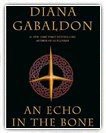Outlander aka Cross Stitch - Gabaldon Diana (читать книгу онлайн бесплатно полностью без регистрации .TXT) 📗
“I’m sorry. I’m showin’ off. I didna mean to startle ye.”
“You’re awfully good,” I said, with sincerity. “Who taught you to fight?” I asked. “I’d think you’d need another left-handed fighter to show you.”
“Aye, it was a left-handed fighter. The best I’ve ever seen.” He smiled briefly, without humor. “Dougal MacKenzie.”
Most of the cherry blossoms had fallen from his head by now; only a few pink petals clung to his shoulders, and I reached out to brush them away. The seam of his shirt had been mended neatly, I saw, if without artistry. Even a rip through the fabric had been catch-stitched together.
“He’ll do it again?” I said abruptly, unable to stop myself.
He paused before answering, but there was no pretense of not understanding what I meant.
“Oh, aye,” he said at last, nodding. “It gets him what he wants, ye see.”
“And you’ll let him do it? Let him use you that way?”
He looked past me, down the hill toward the tavern, where a single light still showed through chinks in the timbers. His face was smooth and blank as a wall.
“For now.”
We continued on our rounds, moving no more than a few miles a day, often stopping for Dougal to conduct business at a crossroads or a cottage, where several tenants would gather with their bags of grain and bits of carefully hoarded money. All was recorded in ledgers by the quick-moving pen of Ned Gowan, and such receipts as were needed dispensed from his scrap-bag of parchment and papers.
And when we reached a hamlet or village large enough to boast an inn or tavern, Dougal would once more do his turn, standing drinks, telling stories, making speeches, and finally, if he judged the prospects good enough, he would force Jamie to his feet to show his scars. And a few more coins would be added to the second bag, the purse bound for France and the court of the Pretender.
I tried to judge such scenes as they developed, and step outside before the climax, public crucifixion never having been much to my taste. While the initial reaction to the sight of Jamie’s back was horrified pity, followed by bursts of invective against the English army and King George, often there was a slight flavor of contempt that even I could pick up. On one occasion I heard one man remark softly to a friend in English, “An awfu’ sight, man, is it no? Christ, I’d die in my blood before I let a whey-faced Sassenach to use me so.”
Angry and miserable to start with, Jamie grew more wretched each day. He would shrug back into his shirt as soon as possible, avoiding questions and commiseration, and seek an excuse to leave the gathering, avoiding everyone until we took horse the following morning.
The breaking point came a few days later, in a small village called Tunnaig. This time, Dougal was still exhorting the crowd, a hand on Jamie’s bare shoulder, when one of the onlookers, a young lout with long, dirty brown hair, made some personal remark to Jamie. I couldn’t tell what was said, but the effect was instantaneous. Jamie wrenched out of Dougal’s grasp and hit the lad in the stomach, knocking him flat.
I was slowly learning to put a few words of Gaelic together, though I could in no way be said to understand the language yet. However, I had noticed that I often could tell what was being said from the attitude of the speaker, whether I understood the words or not.
“Get up and say that again,” looks the same said in any schoolyard, pub, or alley in the world.
So does “Right you are, mate,” and “Get him, lads!”
Jamie disappeared under an avalanche of grimy work clothes as the rents-table went over with a crash beneath the weight of brown-hair and two of his friends. Innocent bystanders pressed back against the walls of the tavern and prepared to enjoy the spectacle. I sidled closer to Ned and Murtagh, eyeing the heaving mass of limbs uneasily. A lonely flash of red hair showed occasionally in the twisting sea of arms and legs.
“Shouldn’t you help him?” I murmured to Murtagh, out of the corner of my mouth. He looked surprised at the idea.
“No, why?”
“He’ll call for help if he needs it,” said Ned Gowan, tranquilly watching from my other side.
“Whatever you say.” I subsided doubtfully.
I wasn’t at all sure Jamie would be able to call for help if he needed it; at the moment he was being throttled by a stout lad in green. My personal opinion was that Dougal would soon be short one prime exhibit, but he didn’t seem concerned. In fact, none of the watchers seemed at all bothered by the mayhem taking place on the floor at our feet. A few bets were being taken, but the overall air was one of quiet enjoyment of the entertainment.
I was glad to notice that Rupert drifted casually across the path of a couple of men who seemed to be contemplating joining the action. As they took a step toward the fray, he bumbled absentmindedly into their way, hand lightly resting on his dirk. They fell back, deciding to leave well enough alone.
The general feeling appeared to be that three to one was reasonable odds. Given that the one was quite large, an accomplished fighter, and obviously in the grip of a berserk fury, that might be true.
The contest seemed to be evening out with the abrupt retirement of the stout party in green, dripping blood as the result of a well-placed elbow to the nose.
It went on for several minutes more, but the conclusion became more and more obvious, as a second fighter fell by the wayside and rolled under a table, moaning and clutching his groin. Jamie and his original antagonist were still hammering each other earnestly in the middle of the floor, but the Jamie-backers amongst the spectators were already collecting their winnings. A forearm across the windpipe, accompanied by a vicious kidney punch, decided brown-hair that discretion was the better part of valor.
I added a mental translation of “That’s enough, I give up,” to my growing Gaelic/English word list.
Jamie rose slowly off the body of his last opponent to the cheers of the crowd. Nodding breathlessly in acknowledgment, he staggered to one of the few benches still standing, and flopped down, streaming sweat and blood, to accept a tankard of ale from the publican. Gulping it down, he set the empty tankard on the bench and leaned forward, gasping for breath, elbows on his knees and the scars on his back defiantly displayed.
For once he was in no hurry to resume his shirt; in spite of the chill in the pub, he remained half-naked, only putting on his shirt to go outside when it was time to seek our lodging for the night. He left to a chorus of respectful good nights, looking more relaxed than he had in days, in spite of the pain from scrapes, cuts, and assorted contusions.
“One scraped shin, one cut eyebrow, one split lip, one bloody nose, six smashed knuckles, one sprained thumb, and two loosened teeth. Plus more contusions than I care to count.” I completed my inventory with a sigh. “How do you feel?” We were alone, in the small shed behind the inn where I had taken him to administer first aid.
“Fine,” he said, grinning. He started to stand up, but froze halfway, grimacing. “Aye, well. Perhaps the ribs hurt a bit.”
“Of course they hurt. You’re black and blue – again. Why do you do such things? What in God’s name do you think you’re made of? Iron?” I demanded irritably.
He grinned ruefully and touched his swollen nose.
“No. I wish I were.”
I sighed again and prodded him gently around the middle.
“I don’t think they’re cracked; it’s only bruises. I’ll strap them, though, in case. Stand up straight, roll up your shirt, and hold your arms out from your sides.” I began to tear strips from an old shawl I’d got from the innkeeper’s wife. Muttering under my breath about sticking plaster and other amenities of civilized life, I improvised a strap dressing, pulling it tight and fastening it with the ring-brooch off his plaid.



